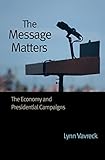The Message Matters : The Economy and Presidential Campaigns / Lynn Vavreck.
Material type: TextPublisher: Princeton, NJ : Princeton University Press, [2009]Copyright date: ©2009Edition: Course BookDescription: 1 online resource (232 p.) : 28 line illus. 39 tablesContent type:
TextPublisher: Princeton, NJ : Princeton University Press, [2009]Copyright date: ©2009Edition: Course BookDescription: 1 online resource (232 p.) : 28 line illus. 39 tablesContent type: - 9780691139630
- 9781400830480
- 324.973/092 22
- online - DeGruyter
- Issued also in print.
| Item type | Current library | Call number | URL | Status | Notes | Barcode | |
|---|---|---|---|---|---|---|---|
 eBook
eBook
|
Biblioteca "Angelicum" Pont. Univ. S.Tommaso d'Aquino Nuvola online | online - DeGruyter (Browse shelf(Opens below)) | Online access | Not for loan (Accesso limitato) | Accesso per gli utenti autorizzati / Access for authorized users | (dgr)9781400830480 |
Frontmatter -- CONTENTS -- LIST OF FIGURES -- LIST OF TABLES -- ACKNOWLEDGMENTS -- PROLOGUE -- Chapter One. PRESIDENTIAL CAMPAIGNS -- PART I -- Chapter Two. HOW AND WHY CAMPAIGNS MATTER -- Chapter Three. CONTEXT MATTERS: A CAMPAIGN TYPOLOGY -- PART II -- Chapter Four. THE MEDIA DISCONNECT: MEDIA AND CANDIDATE MESSAGES -- Chapter Five. THE MESSAGE MATTERS: CANDIDATE-LEVEL TESTS OF THE THEORY -- PART III -- Chapter Six. THE MESSAGE MATTERS: MICROLEVEL TESTS OF THE THEORY -- Chapter Seven. CANDIDATES CREATING CONTEXT -- APPENDIX -- REFERENCES -- INDEX
restricted access online access with authorization star
http://purl.org/coar/access_right/c_16ec
The economy is so powerful in determining the results of U.S. presidential elections that political scientists can predict winners and losers with amazing accuracy long before the campaigns start. But if it is true that "it's the economy, Stupid," why do incumbents in good economies sometimes lose? The reason, Lynn Vavreck argues, is that what matters is not just the state of the economy but how candidates react to it. By demonstrating more precisely than ever before how candidates and their campaigns affect the economic vote, The Message Matters provides a powerful new way of understanding past elections--and predicting future ones. Vavreck examines the past sixty years of presidential elections and offers a new theory of campaigns that explains why electoral victory requires more than simply being the candidate favored by prevailing economic conditions. Using data from presidential elections since 1952, she reveals why, when, and how campaign messages make a difference--and when they can outweigh economic predictors of election outcomes. The Message Matters does more than show why candidates favored by the economy must build their campaigns around economic messages. Vavreck's theory also explains why candidates disadvantaged by the economy must try to focus their elections on noneconomic issues that meet exacting criteria--and why this is so hard to do.
Issued also in print.
Mode of access: Internet via World Wide Web.
In English.
Description based on online resource; title from PDF title page (publisher's Web site, viewed 30. Aug 2021)


